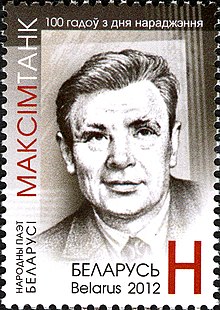Maxim Tank (Q2419271) From Wikidata. Jump to navigation Jump to search. Belarusian poet. Language Label Description Also known as; English: Maxim Tank. Belarusian poet. 0 references. Described by source. Armenian Soviet Encyclopedia. Imported from Wikimedia project. Armenian Wikipedia. 1,110 Followers, 1,489 Following, 249 Posts - See Instagram photos and videos from Maksim Nenezic (@ksomares).
(pen name of Evgenii Ivanovich Skurko). 4 (17), 1912, in the village of Pil’kovshchina, in what is now Miadel’ Raion, Minsk Oblast. Byelorussian poet. People’s Poet of the Byelorussian SSR (1968). Academician of the Academy of Sciences of the Byelorussian SSR (1972). Hero of Socialist Labor (1974).
Member of the CPSU since 1936. As a participant in the revolutionary movement in Western Byelorussia, Tank was frequently arrested. Programma proverki znanij bondarenko ekzamen versiya 1. His verse collections Prisoners at Transportation Stations (1936), Cranberry Color (1937), and Before the Mast (1938) and his narrative poem Naroch’ (1937) dealt with the efforts of the toiling masses to liberate their native land. During the Great Patriotic War (1941–45), Tank contributed to front-line partisan publications. His works of this period included the narrative poem Ianuk Sialiba (1942) and the verse collections Prepare to Fire and Across the Fiery Horizon (both 1945).
Tank has also written That They Might Know (1948; State Prize of the USSR, 1948), On Stone, Iron, and Gold (1951), Trace of Lightning (1957), My Daily Bread (1962), A Drink of Water (1964), Pages From a Calendar: Diary Notes (1970), and Let There Be Light (1972). Tank’s poetry combines a lofty romantic spirit with a realistic and sensual perception of the world and a broad intellectual horizon. His wide variety of poetic forms ranges from folk poetry to modern free verse and from folk songs and folktales to dramatic monologues.
Tank was a deputy to the seventh through ninth convocations of the Supreme Soviet of the USSR. He has been first secretary of the administrative board of the Writers’ Union of the Byelorussian SSR since 1966.

He has been awarded three orders of Lenin, the Order of the October Revolution, and four other orders, as well as several medals.
(pen name of Evgenii Ivanovich Skurko). 4 (17), 1912, in the village of Pil’kovshchina, in what is now Miadel’ Raion, Minsk Oblast. Byelorussian poet. People’s Poet of the Byelorussian SSR (1968). Academician of the Academy of Sciences of the Byelorussian SSR (1972). Hero of Socialist Labor (1974). Member of the CPSU since 1936.
As a participant in the revolutionary movement in Western Byelorussia, Tank was frequently arrested. His verse collections Prisoners at Transportation Stations (1936), Cranberry Color (1937), and Before the Mast (1938) and his narrative poem Naroch’ (1937) dealt with the efforts of the toiling masses to liberate their native land. During the Great Patriotic War (1941–45), Tank contributed to front-line partisan publications.
His works of this period included the narrative poem Ianuk Sialiba (1942) and the verse collections Prepare to Fire and Across the Fiery Horizon (both 1945). Tank has also written That They Might Know (1948; State Prize of the USSR, 1948), On Stone, Iron, and Gold (1951), Trace of Lightning (1957), My Daily Bread (1962), A Drink of Water (1964), Pages From a Calendar: Diary Notes (1970), and Let There Be Light (1972). Tank’s poetry combines a lofty romantic spirit with a realistic and sensual perception of the world and a broad intellectual horizon. His wide variety of poetic forms ranges from folk poetry to modern free verse and from folk songs and folktales to dramatic monologues. Tank was a deputy to the seventh through ninth convocations of the Supreme Soviet of the USSR. He has been first secretary of the administrative board of the Writers’ Union of the Byelorussian SSR since 1966.
He has been awarded three orders of Lenin, the Order of the October Revolution, and four other orders, as well as several medals.
Crack license dat matlab gui. Accept defaults on the following screens; Point to the license.dat file located in the extraction folder (Win/Mac) or click on the right to download (Linux). You can issue the mcc command either from the MATLAB command prompt (MATLAB mode) or the DOS or UNIX command line (stand-alone mode). -Y license.dat File. Matlab 2011a license dat keygen, download Crack, Keygen. In the Digital Library keygens.medianewsonline.com you can find Crack, Keygen and Serial by genre HTML. KeywordCS 1 6 Romanesc Patch PGL GUI 2 70 28 de.
Most Viewed News
- Microsurvey 2017 Crack
- Znak Petlya Mebiusa Vektor
- Copland Clarinet Concerto Pdf
- Maqbool Movie With English Subtitles
- Best Ps3 Emulator For Pc Download
- Autoplay Menu Designer 5 Keygen Crack Patch
- Autocad 2013 Crack 64 Bit Keygen Idm
- Trey Songz Na Na Remix Free Mp3 Download
- Change My Software Android Installer For Apple Ios 11
- Malare Mounama Mp3 Song Free Download
- 1s 83 Patchim Fajl Backbas Dll
- Prezentaciya Na Temu Studencheskaya Zhiznj Na Anglijskom
- Stryer Biochemistry 3rd Edition Pdf Free Programs